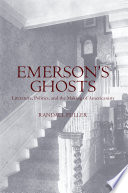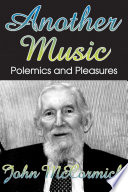 | Ludger H. Viefhues-Bailey - 2007 - 210 pages
...here what Cavell says about a passage in 'The American Scholar' in which Emerson talks about 'the mean in the firkin; the milk in the pan; the ballad in...glance of the eye; the form and the gait of the body' (quoted in SOW, p. 149). Cavell describes this passage as 'a list epitomizing what we may call the... | |
 | Robert Baron, Nick Spitzer - 2010 - 399 pages
...ask not for the great, the remote, the romantic; ... I embrace the common, I explore and sit at the feet of the familiar, the low. Give me insight into...have the antique and future worlds. What would we know the meaning of? The meal in the firkin; the milk in the pan; the ballad in the street; the news... | |
 | Willa Cather - 2007 - 316 pages
...Arabia; what is Greek art, or Provencal minstrelsy; I embrace the common, I explore and sit at the feet of the familiar, the low. Give me insight into...to-day, and you may have the antique and future worlds" (Writings 61). 216 Henrietta Street: Just west of Covent Garden Market and very near 34 to the Duke... | |
 | Randall Fuller - 2007 - 232 pages
...'slop-pail' level."24 Rescuing Emerson from those who would link the author's aesthetics to his celebration of "[t]he meal in the firkin; the milk in the pan; the ballad in the street" (EL 69), Holmes asserts that Emerson "was not often betrayed into the mistake of confounding the prosaic... | |
 | Katherine Ball Ross - 2007 - 336 pages
...read by Ralph Waldo Emerson, he had called for a new approach to American literature: "What would we know the meaning of? The meal in the firkin, the milk in the pan!" Only when I found Sarah Orne Jewett did I think I knew what he meant. What her stories suggested to... | |
 | Erik Kolbell - 2008 - 158 pages
...their wings. As Emerson wrote about his populist muse, "I embrace the common, I explore and sit at the feet of the familiar, the low. Give me insight into...today, and you may have the antique and future worlds." Such was the case a number of years ago, in the small Nicaraguan city of Tipitapa, as I sat at the... | |
 | John McCormick - 2011 - 261 pages
...are going to turn themselves into poets, in mystical union with all other men, because they perceive "The meal in the firkin; the milk in the pan; the ballad in the street; the news of the boat..." Even in Germany reeling before the Napoleonic invasion, Fichte in his "Reden an die deutsche Nation"... | |
| |